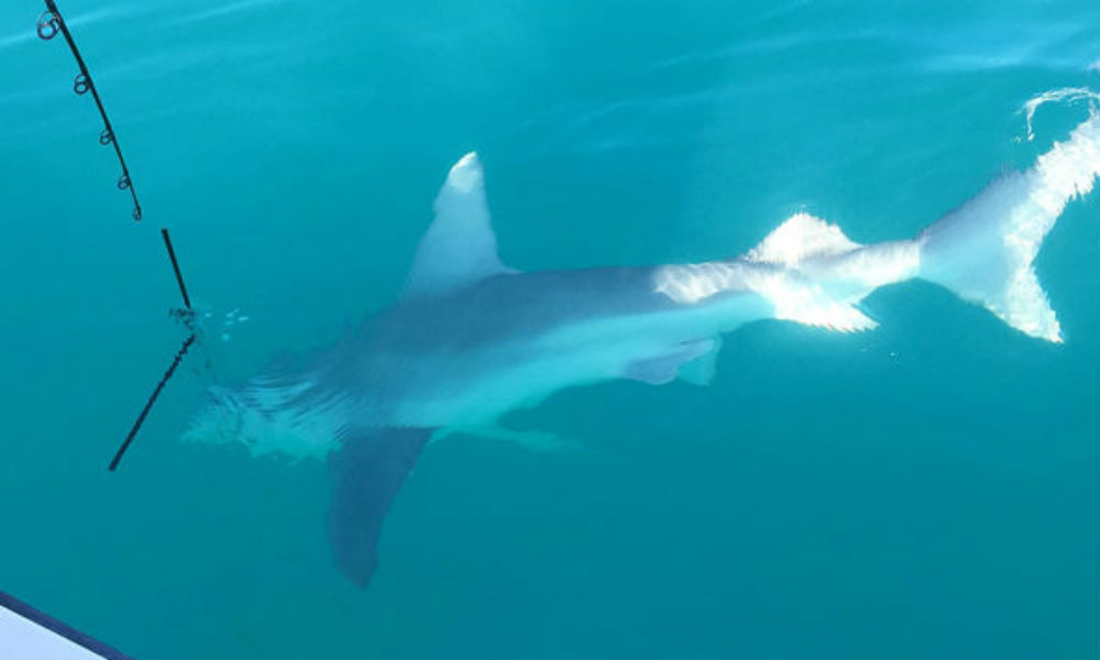Swimming in the deep warm waters of the Gulf of Mexico are many unique species of sharks. Besides gazing at them gracefully floating through the water, many also enjoy fishing for them.
However, shark fishing is a little more intricate compared to normal fishing techniques and requires some things to keep in mind before you go out and hook one.
Shark fishing does come with some rules vital to follow, such as ensuring you have a permit to do so. Sharks are apex predators that play an important role in marine ecosystems. Releasing sharks in a way that increases their chance of survival is an important step toward achieving and maintaining healthy, sustainable shark populations.
Common Sharks Found in the Gulf of Mexico

Blacknose Shark. Photo Credit: NOOA
The Gulf of Mexico is home to many beautiful shark species, 49 to be exact. You’ll find Blacknose, Bull, Finetooth, Lemon, and Oceanic Whitetip sharks to name a few. All of these sharks can swim to great depths in the gulf which makes fishing for them somewhat of a challenge. They also each have their own distinctive personality and swimming preferences, like mingling in the seagrass or going close to the shoreline.
Florida’s Fish & Wildlife Commission places sharks into 3 groups, with groups 1 & 2 as the only sharks that can be fished. Boat limits do apply, so read up on the details. There are a few other things to remember if you want to have a successful shark fishing trip.
Do: Check Your Bait
The most important thing when it comes to shark fishing to use a live or cut bait. It’s also good to use an oily one, like mackerel and bluefish, to entice the shark’s senses. You can cut the bait in various styles, like butterfly, and attach it to your hook to help it better attract a shark.
Do: Create a Plentiful Chum Bucket
To help better bait sharks, you’ll want to create a large chum bucket. You can use gallon buckets to store it in (make sure to drill some holes at the bottom of them) and throw the chum out in the area where you believe the sharks are.
Do: Wait a Few Seconds Before Pulling Up the Line
While it might be tempting to quickly reel the line up when you feel the first tug on it, don’t.
You’ll want to wait for at least 5 seconds before slightly pulling the line up to make sure the hook is secure in the shark’s jaw.
Once you do this, reel the line in quickly.
Also, make sure to keep the boat running and moving slowly when pulling in the line to help make it easier for you to pull the shark into the boat. Make sure though that the shark isn’t close to your boat motor when doing so because they have been known for ripping it off.

Photo credit: Naples Daydreamer Fishing
And Now the Don’ts: Never remove the head or the fin
Florida does not allow bleeding out a shark which is a common practice of cutting off its head. When fishing, the entire shark needs to be kept intact when caught. Cutting off a shark’s fin is illegal in U.S. waters and banned in 11 states, hopefully more will follow suit.
Don’t: Catch Illegal Shark Species
You also need to make sure that you don’t catch certain types of sharks, like the Sand Tiger, which is illegal.
If you do happen to catch one, immediately free it from your line and throw it back.
Other shark species also have some weight and length regulations that you need to follow.
You’ll want to make sure that any shark you catch meets the requirements for that species and that you know all of the rules before dropping your line.
Hooked a Shark or a Sport Fish?
One of the trickiest things when it comes to shark fishing is telling whether or not the creature on the other end of your line is a shark or sport fish. While it can be difficult to tell, one of the best ways you can do so is by checking the curve of your fishing rod. Because sharks are heavy creatures, they will cause the rod to bend significantly.
If you see that it’s almost completely bent, as if it might snap in half, you more than likely have hooked a shark.
For full shark regulations in the state of Florida, check out this link.
There are several local fishing charters who can hook you up with a shark fishing expedition. Learn more here.

